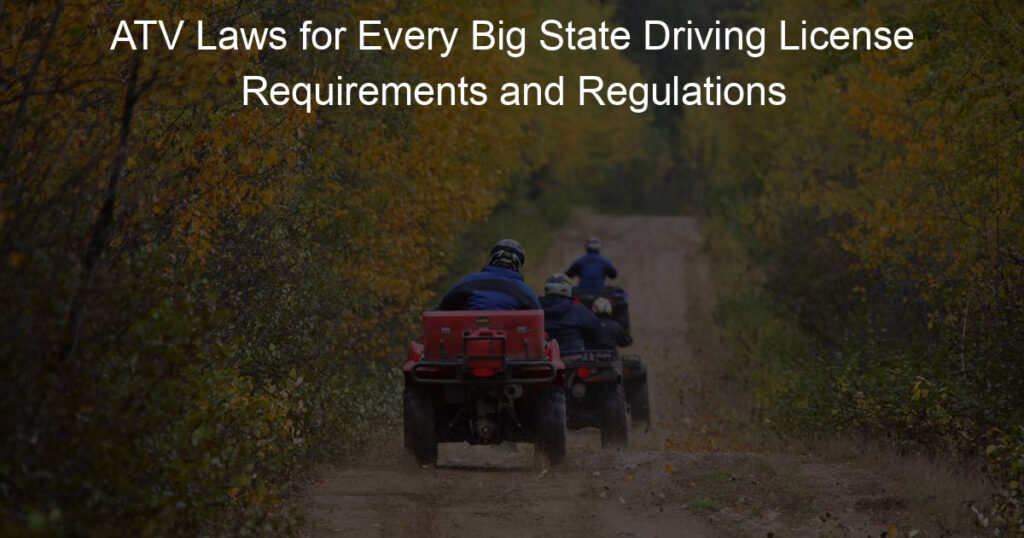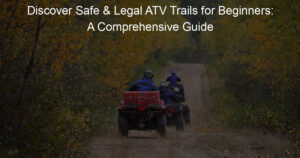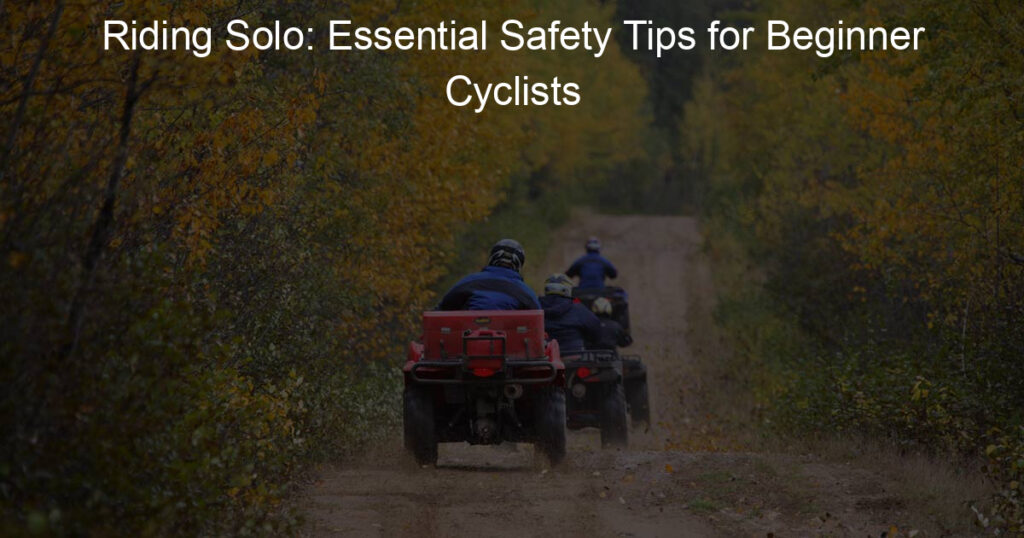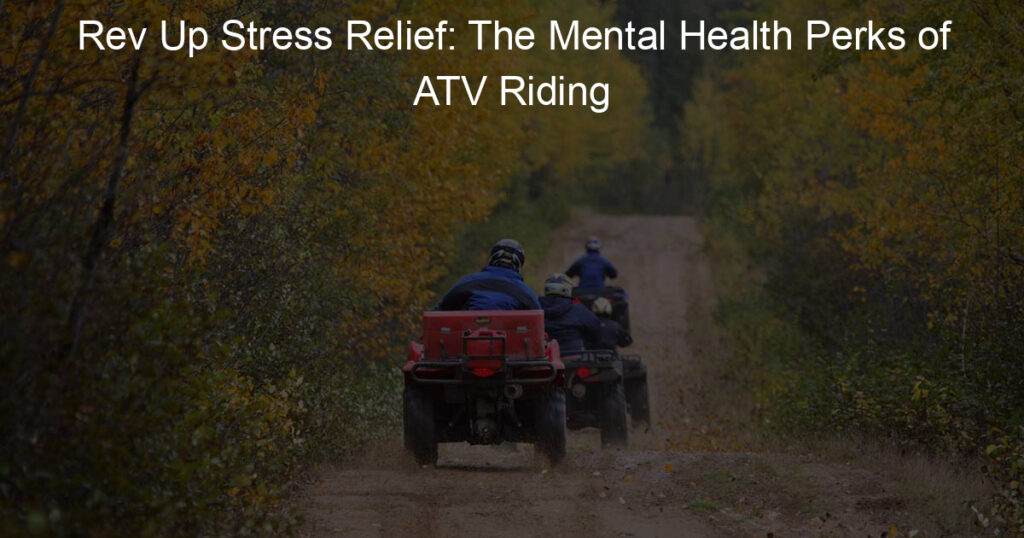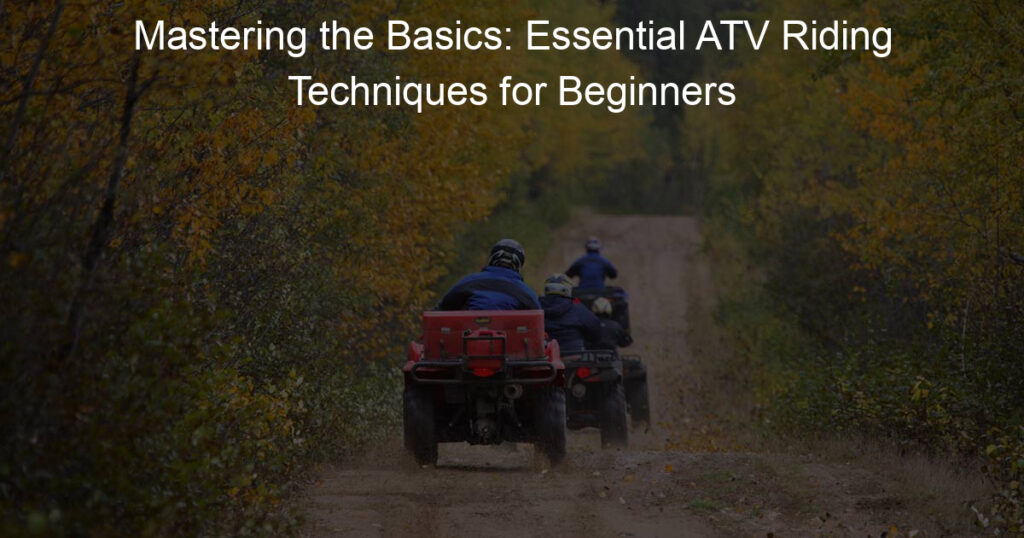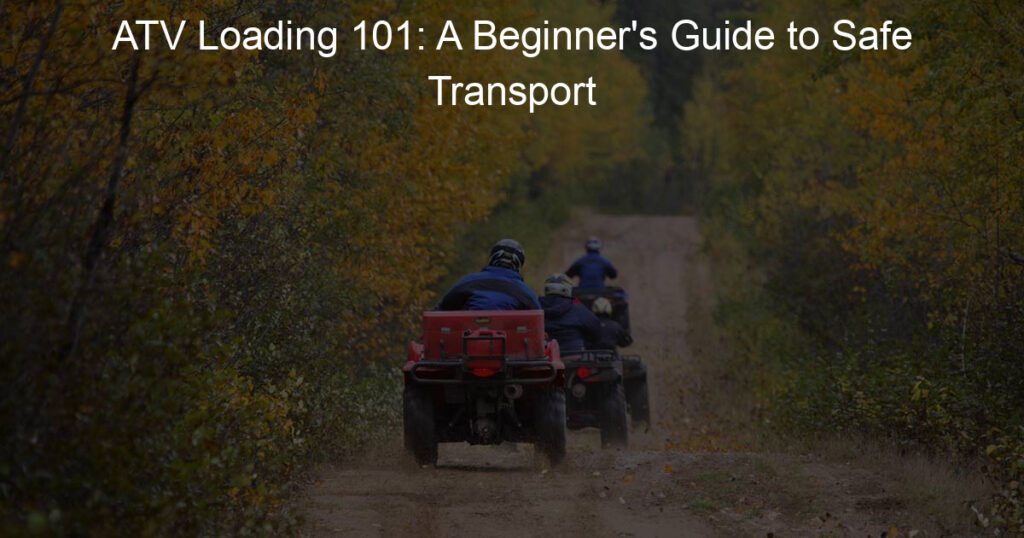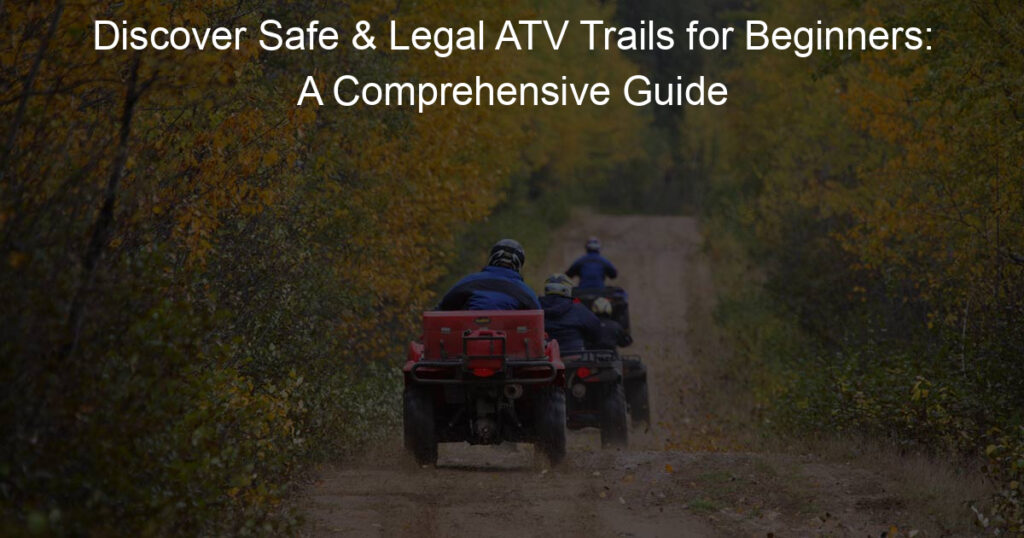ATV enthusiasts across the country understand the thrill of tearing up trails on four-wheelers. However, being aware of your state’s laws and regulations concerning ATVs is essential to ensure a safe and legal riding experience.
Each state has its own requirements regarding ATV driving licenses, as well as rules surrounding rider age, equipment, and where you’re allowed to ride.
Navigating the varying ATV laws and requirements in different states can be challenging. Factors like obtaining a driving license for your ATV, understanding equipment requirements, and knowing which areas permit riding are crucial components of responsible, legal ATV usage.
Furthermore, proper insurance coverage and knowledge of potential legal penalties for violations can safeguard both your well-being and your wallet.
Key Takeaways
- Understand your state’s ATV laws and requirements, including driving licenses and equipment
- Comply with legal regulations and insurance coverage in all ATV usage
- Remain aware of potential legal penalties for violations to ensure safe and responsible riding experiences
ATV Laws for Every Big State Driving License Requirements

When it comes to ATV laws across various states, each state has its own specific rules and regulations regarding licensing, registration, and safety requirements. To ensure you are in compliance with your state’s laws, it’s important to familiarize yourself with the guidelines before embarking on your ATV adventures.
In some states, like Arizona, operating an ATV recklessly or under the influence of drugs or alcohol is strictly prohibited and can result in a citation or penalty. It’s crucial to always ride responsibly and prioritize safety for both you and those around you.
Insurance requirements vary as well. For instance, Arizona mandates that every motor vehicle operated on roads must be covered by liability insurance. This proof of insurance is necessary for registration with the DMV.
Take note that while the rule applies to golf carts, motorcycles, and mopeds, it does not specifically cite ATVs. Make sure to check with your local DMV and insurance provider about coverage.
Furthermore, different states have unique equipment and safety requirements for ATVs. The ATV Safety Institute provides information on these laws, including helmet requirements, age restrictions, and trail regulations.
It’s important to adhere to these rules to avoid facing penalties or harming yourself or others during your ride.
Lastly, if you plan on taking your ATV on vacation out of state, remember that the laws may differ from your home state. Familiarize yourself with the laws and requirements in the destination state to ensure a safe and enjoyable trip.
By staying informed about ATV laws and requirements in your state and any others you may visit, you can help promote responsible riding and ensure a fun experience for you and your fellow ATV enthusiasts.
Driving Licenses and ATV Usage
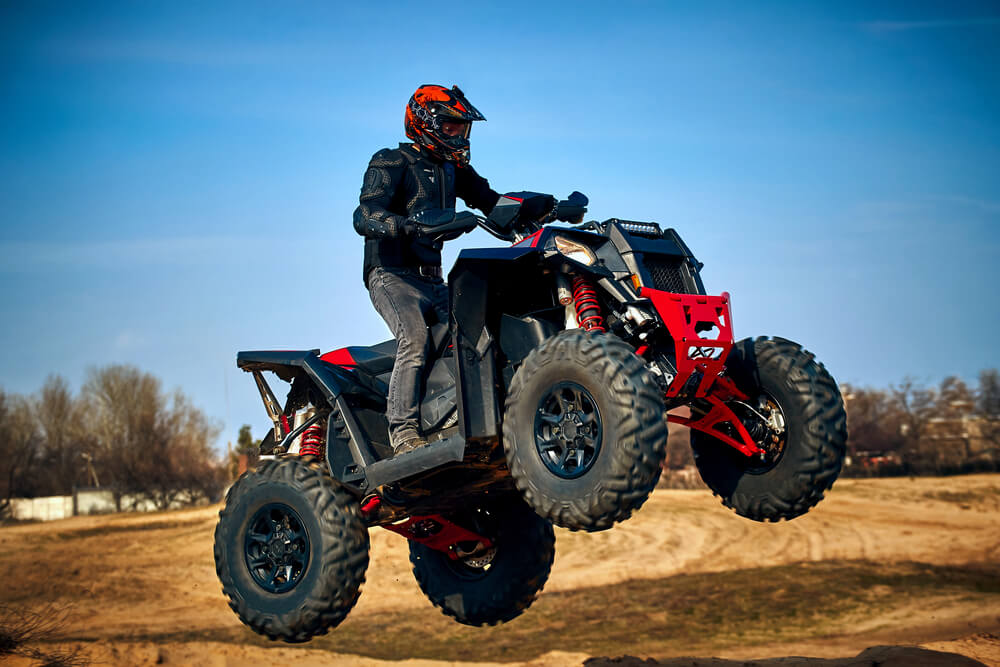
Understanding ATV License Requirements
Each state has its own set of laws and requirements for ATV usage, which includes driving license conditions. Some states may require you to possess a valid driver’s license, while others may issue a specific ATV license.
It is crucial to familiarize yourself with the laws in your residing state or where you plan to ride your ATV, as these laws may vary significantly and affect your enjoyment of the activity.
To find your state’s requirements, consult the ATV Safety Institute or more specific resources, such as the ATV MAN website, which provides a comprehensive list of ATV laws for every state.
Acquiring an ATV License
Once you understand your state’s licensing requirements, the next step is to acquire any necessary licenses or permits to legally operate your ATV. Procedures for acquiring an ATV license may involve:
- Applying in person at a Department of Motor Vehicles (DMV) office
- Completing a mandatory ATV safety course
- Paying applicable fees
- Passing written and skills tests, depending on your state’s laws
It is essential to complete all required steps to obtain the proper license or permit, as driving without the necessary documentation could result in hefty fines or legal issues.
In addition to driving licenses, be aware of other safety and equipment regulations for your state, as well as restrictions on where ATV riding is allowed. These rules contribute to a safe and enjoyable ATV riding experience for you and others sharing the trail.
State-Specific ATV Laws

California
In California, ATV riders are required to register their vehicles with the Department of Motor Vehicles (DMV) and obtain a special ATV decal. All ATV riders, regardless of age, must wear an approved safety helmet while operating their vehicle.
Additionally, ATVs must be equipped with working headlights and taillights if used during nighttime hours. Riding on public highways is generally prohibited, but designated off-road trails are available throughout the state 1.
Texas
Texas law requires ATV riders to have a title for their vehicle, but registration and insurance are not mandatory. Riders under the age of 14 must be supervised by a responsible adult, and all riders must wear a helmet.
It’s crucial to note that riding on public roads is generally prohibited, with some exceptions for farm-related activities. Many off-road parks and trails are available for recreational riding 2.
Florida
In Florida, ATV riders must register their vehicle with the Department of Highway Safety and Motor Vehicles (DHSMV). No titling or insurance requirements are in place. Riders under 16 must wear a helmet and eye protection. Additionally, Florida prohibits ATV use on public roads, except when crossing at a 90-degree angle. Designated riding areas can be found throughout the state 3.
New York
New York requires ATV registration, titling, and insurance. Riders under the age of 16 must wear a helmet, undergo an approved safety training course, and be supervised by an adult. ATV use on public highways is forbidden unless designated as an ATV route. A wide variety of off-road parks and trails are available for recreational riding 4.
Illinois
Illinois mandates registration, titling, and insurance for ATVs. All riders under the age of 18 must wear a helmet, and children under 10 are not permitted to operate an ATV. Riding on public roads is generally not allowed, but specific routes may be designated for ATV use. The state offers numerous off-road parks and trails for recreational use 5.
Pennsylvania
In Pennsylvania, ATV riders need to register their vehicle and have liability insurance. Riders under 16 must wear a helmet and complete an approved safety training course. The state generally forbids ATV use on public roads, but some exceptions exist for specific routes. Pennsylvania offers numerous off-road parks and trails for riders to enjoy 6.
Ohio
Ohio requires registration and insurance for ATVs but does not mandate titling. All riders under 18 must wear a helmet, and riders under 16 must be supervised by an adult. Generally, ATVs are not allowed on public roads, with some exceptions. Ohio has a variety of off-road parks and trails for recreational ATV use 7.
Georgia
In Georgia, ATV riders must register their vehicle but are not required to have insurance or a title. Georgia law dictates that riders under 16 must wear a helmet and eye protection, and those under 12 must be supervised by an adult. The use of ATVs on public roads is generally prohibited. Georgia provides a range of off-road parks and trails for riders to enjoy 8.
North Carolina
North Carolina mandates ATV registration but does not require insurance or titling. Riders under the age of 18 must wear a helmet and eye protection. Riding on public roads is typically not allowed, but specific routes may be designated for ATV use. The state offers numerous off-road parks and trails for riders to explore 9.
Michigan
In Michigan, ATV riders are required to register their vehicle and have a valid ORV license. Insurance and titling are not necessary. Riders under 16 must wear a helmet and be supervised by an adult. Generally, Michigan prohibits ATV use on public roads, with some exceptions. The state provides an extensive network of off-road parks and trails for riders 10.
Footnotes
- (https://atvsafety.org/state-rules/) ↩
- (https://atvman.com/atv-laws/) ↩
- (https://4wheelslifer.com/atv-laws-for-every-big-state-driving-licenses/) ↩
- (https://www.offroadguide.net/state-atv-laws/) ↩
- (https://atvlegion.com/atv-laws-by-state/) ↩
- (https://atvsafety.org/state-rules/) ↩
- (https://atvman.com/atv-laws/) ↩
- (https://4wheelslifer.com/atv-laws-for-every-big-state-driving-licenses/) ↩
- (https://www.offroadguide.net/state-atv-laws/) ↩
- (https://atvlegion.com/atv-laws-by-state/) ↩
Legal Penalties for Violations
When driving an ATV, it’s essential to know the laws and requirements of your state to avoid legal penalties. Each state has different rules and regulations; understanding them can save you from fines, citations, or even license suspension.
In states like Arizona, reckless driving can lead to citations. This includes operating an ATV under the influence of drugs or alcohol. Arizona strictly enforces such rules, so you must take care when using your ATV.
California, on the other hand, does not require you to register or insure your ATV. However, you’ll need to title your ATV, and there are age restrictions for operators: anyone under 14 years old must be able to reach the operational controls of the ATV to be legally allowed to operate.
As you may take your ATV on vacation, it’s crucial to know the rules for your destination state. Double-check any state and local regulations along your route, such as registration requirements, open and prohibited trails, speed limits, and rider age restrictions.
Remember, being aware of the legal penalties in each state helps ensure that your ATV adventures remain enjoyable and trouble-free. Keep up-to-date with the latest ATV laws, and make sure to adhere to them while operating your vehicle.
Safety Recommendations for ATV Usage

Before hitting the trails on your all-terrain vehicle (ATV), it’s essential to be aware of the recommended safety precautions. While laws and regulations may vary depending on your location, these guidelines will help ensure a safe and enjoyable riding experience for you and those around you.
First and foremost, always wear proper protective gear, such as a helmet, eye protection, boots, gloves, long pants, and a long-sleeved shirt. This type of gear can significantly reduce the risk of injuries in the event of an accident.
According to CPSC.gov, wearing a helmet alone can reduce the risk of head injuries by 60%.
When operating an ATV, it’s crucial to stay within your skill level and not attempt dangerous stunts or high-speed maneuvers beyond your capabilities. Additionally, avoid riding on public roads, as ATVs are not designed for such surfaces and can lead to accidents involving other vehicles.
It’s also essential to be familiar with the specific ATV laws for your state, as some states may require a driving license or other certifications. Regulations may also dictate where you can ride legally, so be sure to educate yourself on the approved locations for ATV use in your area.
Make sure your ATV is in good condition by performing regular maintenance checks, including inspecting the tires, brakes, and all essential components. It’s also a good idea to carry a basic repair kit and first-aid supplies during your ride.
Lastly, always ride responsibly and use common sense. Be aware of your surroundings, respect the environment, and consider the safety of other riders and bystanders.
By adhering to these safety recommendations, you’ll be well on your way to a fun and secure ATV experience.
Role of Insurance in ATV Usage
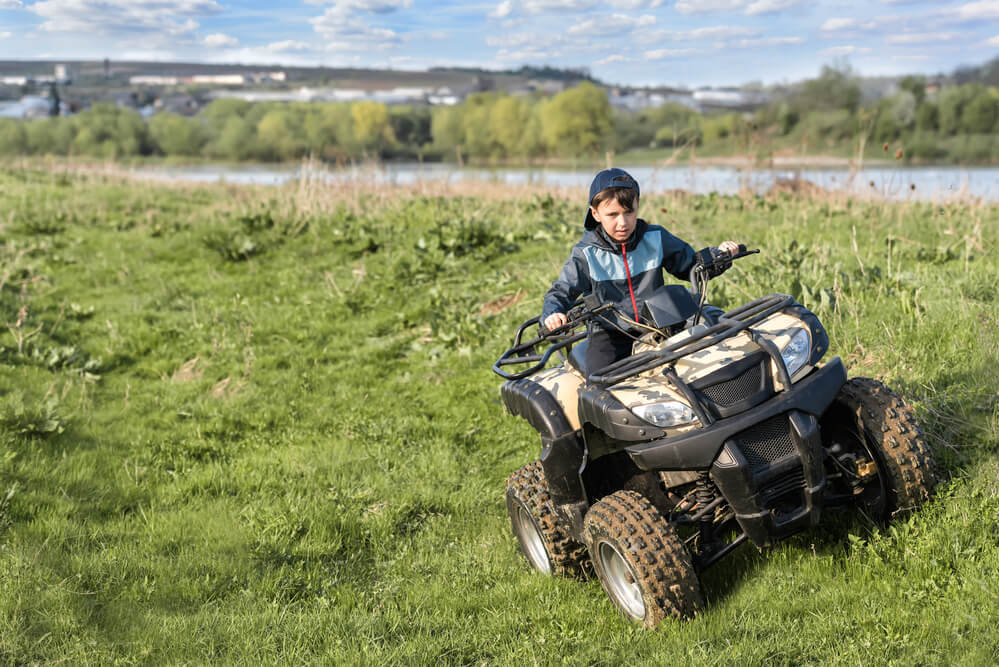
When it comes to owning and operating an ATV, having the right insurance coverage can offer you peace of mind and financial protection. While many states do not require insurance for ATVs, UTVs, and similar off-road vehicles, some do have specific requirements that you need to be aware of.
Further, insurance may be mandatory at certain private trails and parks where you plan to ride.
Liability insurance is an essential aspect to consider when owning an ATV. It helps protect you if you cause an accident that results in property damage or injuries to others.
For example, in Alaska, you must register your ATV with the state and have basic liability insurance. Before legally driving your ATV around Alaska, you have to show the DMV proof of said insurance.
It’s also worth noting that insurance requirements can vary significantly from state to state, so it’s crucial to familiarize yourself with the specific laws and regulations governing ATV usage in your location.
This will ensure you are in compliance and avoid any potential fines or legal trouble.
Apart from liability insurance, you may want to consider additional coverage options to keep your investment safe. Comprehensive and collision insurance can offer protection in case your ATV is damaged, stolen, or vandalized, while uninsured/underinsured motorist coverage can be an essential safety net when you’re involved in an accident with a driver who does not have adequate insurance.
In conclusion, although insurance requirements for ATVs may not be the same across all states, being properly insured can save you from financial stress and ensure a smooth and worry-free riding experience.
Take the time to research the specific laws in your state and choose the coverage that best suits your needs.
Conclusion
In summary, as an ATV enthusiast, you should always be aware of the different ATV laws in each big state concerning driving licenses. Staying informed about these requirements is crucial to ensure not only your safety but also to avoid violating state regulations when riding an ATV.
It is essential to remember that each state has its own set of ATV laws and requirements, including registration, driving licenses, and age restrictions. Familiarize yourself with these legal matters to avoid any complications during your ATV expeditions.
Furthermore, don’t forget to comply with the safety guidelines laid out by each state. These may include wearing appropriate headwear, protective eyewear, and other personal protective equipment while operating an ATV.
This way, you are keeping yourself and other riders safe on the trails.
Lastly, always research the ATV laws for the state you plan to visit, as rules may vary by location. Doing so will ensure a smooth and enjoyable experience when riding across different states on your ATV adventures.
Stay informed, stay safe, and have fun exploring the great outdoors with your ATV.
Frequently Asked Questions
Do age requirements vary for ATV driving by state?
Yes, age requirements for ATV driving vary by state. It’s important to check your state’s specific laws and regulations before allowing minors to operate an ATV. Some states have minimum age requirements, while others focus on mandatory safety training and certification for younger riders.
Is a special license needed to operate an ATV in California?
In California, you are not required to obtain a special license to operate an ATV. However, if you are under 18 years old, you must complete an approved ATV safety training course and carry the certificate of completion with you while operating the ATV.
Additionally, riders under 14 must be supervised by an adult who has completed the safety course or is a licensed driver.
What are the licensing rules for ATVs in Texas?
In Texas, no specific licensing is required to operate an ATV off-road. However, if you plan to use your ATV on public lands or roads, it must be registered and display a visible license plate. The operator must also have a valid driver’s license or learn-to-ride certificate from a certified ATV safety training course.
Are there any license requirements for ATVs in Florida?
Florida does not require a special license for ATV operators. However, operators under the age of 16 are required to complete an approved ATV safety training course before operating an ATV unsupervised. Additionally, all riders under 18 years old are required to wear a helmet while operating an ATV.
Do you need a license to drive an ATV in Pennsylvania?
In Pennsylvania, you are not required to have a special license to operate an ATV. However, you do need a valid driver’s license if you want to operate your ATV on a road that has been designated and approved for ATV use. For off-road use, no license is required.
What are the ATV road legality laws in Georgia?
In Georgia, ATVs are not permitted on public roads or highways except when crossing a road at a 90-degree angle. There is no special license required to operate an ATV off-road. For operators under 16 years old they must be accompanied by an adult administrator. Always ensure you adhere to Georgia’s laws while operating an ATV, as found on 4WheelsLifer.com.

